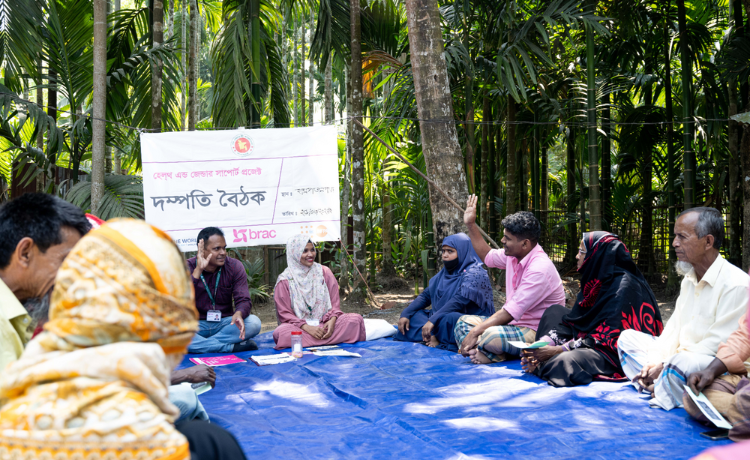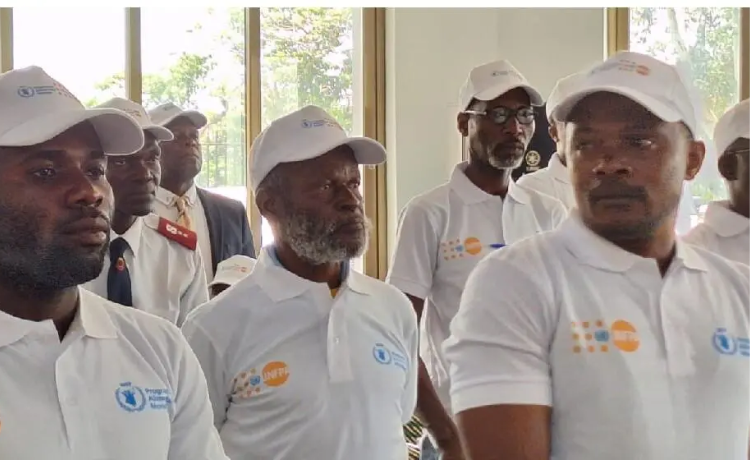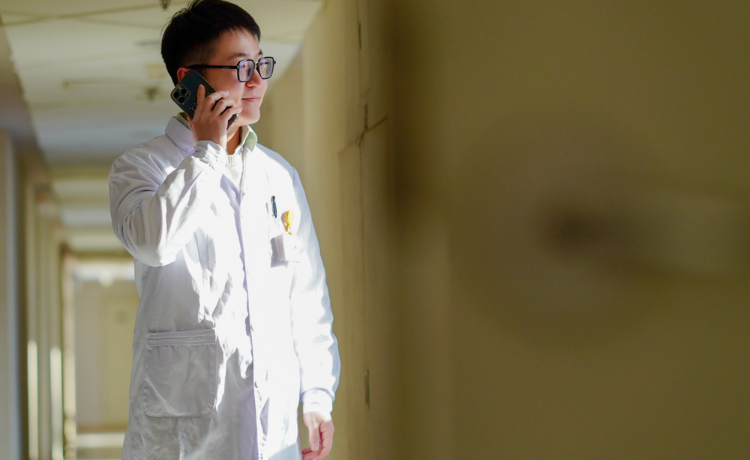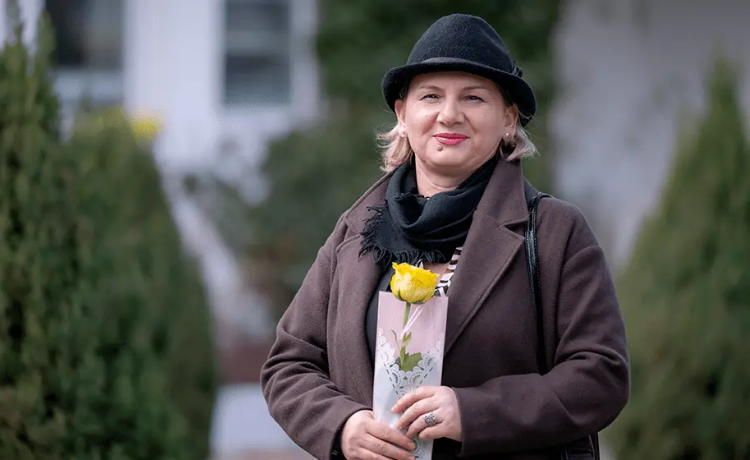News
Four ways to build positive relationships and achieve good sexual health
- 04 September 2024
News
UNITED NATIONS, New York – Everyone has the right to enjoy sexual health, and to engage in safe, satisfying and fulfilling relationships that honour their bodily autonomy and uphold gender equality. But no one is born knowing how to build positive partnerships; rather, it takes time, education and empowerment for people to become positive partners.
Around the world, UNFPA, the United Nations sexual and reproductive health agency, works to support people with the information and services they need to develop positive relationships and reject those marked by violations and violence. Below, read four ways couples and individuals have learned to build communication skills, defend their reproductive rights and achieve good sexual health.

Every couple has disagreements, and Jahangir and Shirin, who live with their two children in Ramu, Cox’s Bazar, used to be no different. “We had too many arguments – about business, household chores, parenting and so on,” they told UNFPA. “Neither of us was skilled in resolving our conflicts.”
But things have changed since the husband and wife began attending ‘Couple’s Meetings’ a year ago. These discussions, aimed at promoting healthy gender relations, have enabled Jahangir and Shirin to talk over their differences and insecurities with honesty, empathy and self-awareness.
“Finding common ground as a team ended the nitpicking,” said Jahangir. “Why would I find fault with my wife? We are on the same team.”
Previously, the duo struggled to balance competing priorities: Jahangir ran the family’s store while Shirin tended their land and maintained the home. Feeling strained, Shirin wanted to hire help – something Jahangir felt they could never afford.
“The meetings made me realize there was a quick fix to our situation – an obvious solution that I had never considered, or perhaps did not want to consider,” Jahangir said. “It was to share the household work with Shirin and play an equal parenting role. So now I also cook, clean and take the children to the school.”
Since 2021, 17,000 couples in Cox’s Bazar have attended these sessions. Meanwhile, Jahangir and Shirin have become vocal advocates. “Our marriage has never been better,” said Shirin.

“I used to think that a man's role was limited to providing for the family,” husband school participant Jean-Pierre told UNFPA. “Through this training, I realized we also have a responsibility to support the health and well-being of our partners and children, and to combat stereotypes we often don't pay attention to – but which, unfortunately, encourage violence.”
In March 2024, the Government of the Republic of Congo, together with UNFPA, set up 12 husband school programmes across five regions of the country to offer men a space to share experiences and learn about positive masculinity. At these ‘husband schools’, men gather to discuss the importance of supporting women during childbirth, accessing sexual and reproductive health care and preventing gender-based violence.
So far, nearly 900 men have participated, a signal of change that has been mirrored at the national level in the Republic of Congo. In 2022, the country passed legislation aimed at eliminating domestic violence and protecting women and girls from its scourge.

When thoracic surgeon He Yiqi was in junior high school, puberty and hygiene were only discussed during two classes – the second of which was interrupted by a fellow student.
“A girl exclaimed, ‘That's so disgusting!’” He Yiqi recalled. And so his first comprehensive sexuality education class came to an abrupt halt.
Across many countries and cultures, sexuality can be a taboo topic. But comprehensive sexuality education is crucial to protecting young people’s rights and choices and building positive relationships; research shows it leads to safer sex and less gender-based violence.
In 2012, He Yiqi attended a youth health training programme where he heard sexuality addressed openly for the first time. “I came to understand that ‘sex’ encompasses psychological, physiological and even societal dimensions,” he told UNFPA.
After the programme wrapped, He Yiqi took up the torch of comprehensive sexuality education hoping to illuminate a path forward for more young people. He helped the Hangzhou Family Planning Association set up a youth network, which as of 2022 had conducted almost 1,300 training sessions across 42 universities.
“Every time I am asked what motivates me, several [memories come to] mind: The girl having her first period who thought she was going to die; a college student with an unintended pregnancy who got the wrong medical advice and damaged her reproductive health; the tears in a student’s eyes after a training session,” He Yiqi said, adding he has also benefited.
“I understand the importance of respect in an intimate relationship and finding my partner,” he told UNFPA.

Cervical cancer causes 16,000 deaths a year across Eastern Europe and Central Asia, making it the second-most-deadly cancer to affect women of reproductive age in the region.
The vast majority of these deaths are preventable; screening for and vaccinating against the human papilloma virus, or HPV, could avert 90 per cent of cases. But a lack of access to regular gynaecological exams and the HPV vaccine put thousands of lives at risk.
In February 2022, Arbnesha Kelemendi Draga’s visit to her local public health clinic in Karagaq, in Kosovo*, turned terrifying when a Pap test led to her cervical cancer diagnosis. “I didn't have any symptoms that would have directed me to a gynaecologist.” Ms. Draga told UNFPA. “The doctor said, 'You have a bad illness, but we are on time. We can prevent the worst’.”
Within the week, Ms. Draga underwent surgery and is now recobvering well. The Pap test likely saved her life, as it could for thousands of others. Together with local institutions, UNFPA has worked to incorporate these tests into the primary health system in Kosovo, and they are now available for free; since 2016, over 15,000 women have been screened.
As access to women’s health care has expanded across the Western Balkans, countries like Albania have also sought to ensure marginalized groups’ inclusion in progress. In 2019, the country established its first cervical cancer screening programme; with UNFPA’s support, dozens of health mediators have been trained to promote and facilitate access to these services among the country’s marginalized Egyptian and Roma communities.
“It is not easy to gain trust among vulnerable communities. I strive to help individuals who need guidance to every level of care,” health mediator Grisel Zenuni told UNFPA. “We talk to girls and women about the importance of testing for cervical cancer and provide essential information.”
Meanwhile, in Serbia, cervical cancer survivor Violeta Ivković stressed the importance of the HPV vaccine, which has been available through a free immunization programme since 2022. “I have three children and five grandchildren,” Ms. Ivković told UNFPA. “My children, thanks to what they went through with me [and my diagnosis] when they were little, do not question whether they will vaccinate their children.”
* All references to Kosovo on this website are in line with UN Security Council Resolution 1244 (1999)